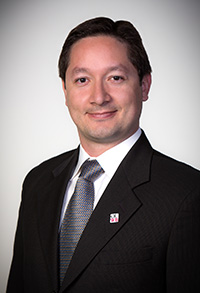
As a way to learn more about the diverse educators who share their expertise with our medical school students, OUWB presents a special interview series called “Take 5.” Let us know what you think.
Assistant Professor Gustavo Patino, M.D., Ph.D., joined Oakland University William Beaumont School of Medicine in 2014 as an assistant professor of Neuroscience in the Department of Biomedical Sciences. He received his M.D. from the Universidad Nacional de Colombia, and his M.S. and Ph.D. in Neuroscience from the University of Michigan.
Prior to joining OUWB, Dr. Patino was an attending physician at Fundacion Los Pisingos Adoption Center, in Bogota, Colombia; a neurology resident at Universidad El Bosque and Fundacion Santa Fe de Bogota Hospital; and a research fellow at the Instituto de Genetica Humana of Universidad de los Andes in Bogota. Most recently, he was an assistant professor at the Medical School of Universidad de los Andes and a postdoctoral fellow in the Department of Neurology at the University of Michigan. He received recognition as Best Intern at the Fundacion Santa Fe Hospital, Bogota, Colombia; received the ProQuest Distinguished Dissertation Award from the University of Michigan; and earned the Young Physician Leader Program award from the Inter-Academy Medical Panel. Dr. Patino’s primary research focuses on the basic mechanisms of seizures in genetic and acquired epilepsies and biomedical education.
On August 1, from 11:30 a.m. – 1 p.m. in 478 O’Dowd Hall, Dr. Patino will present a continuing education workshop called, “A Whirlwind Tour of Contemporary Statistics: Bootstrap, Bayesian Statistics and Machine Learning.” Faculty, staff, physicians, residents, fellows and medical students are welcome to attend.
What do you enjoy most about your job?
Definitely interacting with the students because I really enjoy being able to see through their eyes the discovery of a field that I love. I like seeing their path in becoming physicians and reflecting about my own path of becoming a physician.
Was there a moment when you knew you wanted to go into medicine or to be a professor of medicine?
I think it was an accumulation of many things. On being a professor, it was my desire to share what I learned during my medical training, and how I made it through by reviewing many different resources before things became clear. I wanted to be able to share my experience so that others would have an easier time learning.
In terms of medicine, I liked that medicine is a combination of many fields — biology, chemistry, mathematics, statistics, and psychology, to name just a few. When you’re a physician, you get to use all of these areas on a regular basis.
How did you become interested in researching seizures?
That happened more by happenstance. When I was in residency, I liked a lot of the different disciplines of neurology. When I was in grad school, I found that studying seizures was similar to medicine in that it allowed me to combine so many of the disciplines of neuroscience, such as electrophysiology, genetics, and basic biochemistry.
What do you consider to be the biggest misconception about seizures?
Other than that seizures are only the thrashing kind that we see in the movies, I would say the biggest misconception is that having the diagnosis of epilepsy will preclude most people from living a normal life.
What is the main thing you’d like to inform people about epilepsy?
There’s just so much I would love for everybody to know; for example, what to do in the case of a seizure. You definitely don’t want to put your fingers in the mouth of someone having a seizure for fear that the person will swallow his or her tongue. Also, most people will respond to medications, and if people don’t respond to the medication, we have other alternative treatments to try. The most important thing is for patients to have a neurologist, who specializes in seizures, and a physician whom they feel is dedicated to their care and takes time to answer all of their questions and listen to all of their concerns.
Does anything in particular about OUWB or the OUWB mission resonate with you?
Yes, the expectation that everybody who teaches these students should be a good professor, regardless of how much money you bring in with research grants. That for me was a big draw. When you are teaching, it shouldn’t just be about research money. Teaching is also very important.
Do you have any exciting plans this summer?
I’m going to Mexico and spending a few days at the beach with my wife and daughter before she starts elementary school.
What is something many people don’t know about you?
I think everybody knows that I’m a big nerd, so that isn't it. I don’t think many people know that I love horror movies, the supernatural ones, not the gory type. I like the feeling of being scared in the movies when you know it’s not real.

